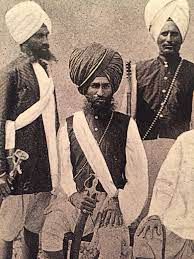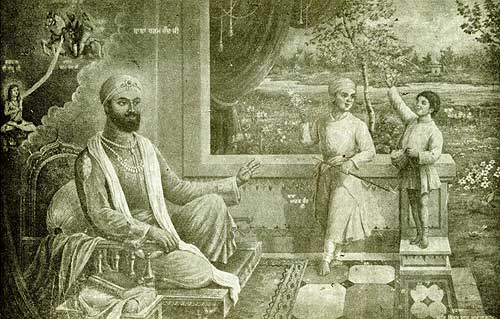Aris Daya Singh (1894 - 1946) was popular writer of devotional and didactic verses. He belonged to a backard rural family of farm labourers called Mazhabi Sikhs. Having been thrased by his poor father, Santa Singh, because of his pursuit of learning, left home and started living as a recluse; learnt Punjabi, Hindi, anskrit, Urdu, Persian and Arabic: and studied scriptures of the Sikhs, Hindus and Muslims from their traditional teachers at their respective places of worship and instruction. He began writing poetry while in teens and published his maiden book, Fanah da Makan (Abode of Mortality), in 1914: followed by his most popular work, Zindagi Bilas (Discourse on Life), in 1915.
DAULOVAL.4 km north of Kiratpur (31° ll`N, 76° 35`E) in Ropar district of the Punjab, is sacred to Guru Har Rai (1630-61), who used to encamp here during his visits in summer. According to local tradition, it was here that the Guru received the royal summons to see the emperor at Delhi. Gurdwara Patshahi Satvin marks the site of the Guru`s camp. Its present building raised in 1965 is a square congregation hall, with a verandah around it. The Gurdwara is managed by the local sangat.
Duggal, Kartar Singh (1917 - ) is one of the most prolific fictionist in Punjabi. He was born at Pothohar town in Dhamiyal (now in Pakistan). He is well-acqainted with the life of rural Punjab, particularly before the Partition which left ever-oozing scars on the psyche of the brave and hard working people of Punjab. After the Partition, he has been living in Jalandher, Delhi and Hyderabad and holding prominent positions in the government and is therefore well-equipped to paint in detail the urban life and its changing scenario. We find several strands in his stories are marked by a consumate artistry and psychological insight.
DALIP SINGH, Babar revolutionary, belonged to the village of Gosal, in Jalandhar district. His father`s name was Ishar Singh. Dalip Singh passed his matriculation examination and became a teacher in a primary school in Jalandhar. During his spare time, he toured the surrounding villages making patriotic speeches. He was drawn into the Akali agitation for Gurdwara reform, but he was too radical by temperament for its nonviolent strategy. He joined the secret Chakravarti group of Karam Singh, of Daulatpur, and soon began to be counted among the leader`s close associates. In March 1922. warrants for his arrest were issued for delivering speeches recommending to the people the creed of "reforming," i.e. liquidating the jholichuks or loyalists of the British.
DHAMTAN, a large village in Jind district of Haryana, is sacred to Guru Tegh Bahadur. He visited it first in 1665 in the course of his travels through Malva and Bangar territories. Chaudhari Daggo, who was a cattle lifter and lived on plunder, came with pitchers full of milk, but the Guru declined the offering saying that he would not take what was not honestly earned. Daggo asked forgiveness for his past misdeeds and promised to abide by the Guru`s teaching. Guru Tegh Bahadur gave him funds to construct a well and a dharamsala for the travellers.








